Just when you thought I’d interviewed all the fascinating authors out there, I found more! Meet Ken Goldman, another writer with a short story in Quoth the Raven.
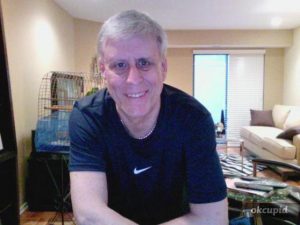 Ken Goldman, former Philadelphia teacher of English and Film Studies, is an affiliate member of the Horror Writers Association. He has homes on the Main Line in Pennsylvania and at the Jersey shore. His stories have appeared in over 885 independent press publications in the U.S., Canada, the UK, and Australia with over thirty due for publication in 2018. Since 1993, Ken’s tales have received seven honorable mentions in The Year’s Best Fantasy & Horror. He has written five books: three anthologies of short stories, You Had Me at Arrgh!! (Sam’s Dot Publishers), Donny Doesn’t Live Here Anymore (A/A Productions) and Star-Crossed (Vampires 2); and a novella, Desiree, (Damnation Books). His first novel Of a Feather (Horrific Tales Publishing) was released in January 2014. Sinkhole, his second novel, was published by Bloodshot Books August 2017.
Ken Goldman, former Philadelphia teacher of English and Film Studies, is an affiliate member of the Horror Writers Association. He has homes on the Main Line in Pennsylvania and at the Jersey shore. His stories have appeared in over 885 independent press publications in the U.S., Canada, the UK, and Australia with over thirty due for publication in 2018. Since 1993, Ken’s tales have received seven honorable mentions in The Year’s Best Fantasy & Horror. He has written five books: three anthologies of short stories, You Had Me at Arrgh!! (Sam’s Dot Publishers), Donny Doesn’t Live Here Anymore (A/A Productions) and Star-Crossed (Vampires 2); and a novella, Desiree, (Damnation Books). His first novel Of a Feather (Horrific Tales Publishing) was released in January 2014. Sinkhole, his second novel, was published by Bloodshot Books August 2017.
And here’s the interview:
Poseidon’s Scribe: When and why did you begin writing fiction?
Ken Goldman: I began writing before I learned to write. Prior to entering kindergarten, I was already drawing pictures to tell stories. I had a cartoon strip from elementary school through Freshman year of college – Sharky the Blimp. The strip turned risque as I got older because someone told me Sharky resembled a flying phallus. But my serious writing began in 1992 when I came in second place in the Second Annual Rod Serling Memorial Foundation’s Writing Contest with a story I’d written as a homework assignment. I figured, hey, someone may pay me money for this stuff. And the rest, as they say, is history. Fiction, but history.
P.S.: Who are some of your influences? What are a few of your favorite books?
K.G.: I always loved Ray Bradbury’s stories, and as a teacher, I always included him in my curriculum. As mentioned above, I was a huge Rod Serling/Twilight Zone fan; I was awed by the sheer imagination of the guy. As a film buff (and also a Film Studies teacher) I used to study every frame of Alfred Hitchcock’s films, and Psycho sealed the deal for me as a horror writer. I wanted to have that same effect on readers, and I try to add some sort of Hitchcock-type twist to every story I write. I also loved the old EC Horror comics (Tales from the Crypt stuff) for the macabre humor. For humor, I loved to read Woody Allen’s books, and I still read Dave Barry. Bios too, of anyone I find interesting. I incorporate occasional absurd humor even in my horror tales. (A rabbi and a werewolf walk into a bar…)
P.S.: How did you come to love the horror genre and why do you write horror?
K.G.: Why do people pay good money to ride the roller coaster only to get the hell scared out of them? It’s fun! As a kid at the amusement piers, I used to stand outside the haunted house ride just to hear the screams and laughter of the people inside. And as a teacher I taught film courses on Horror, never failing to get asses filling those seats every day — and sometimes jumping out of those seats too! Writing horror just comes easy to me. I’m sure a therapist would score several Bermuda vacations with me as a patient.
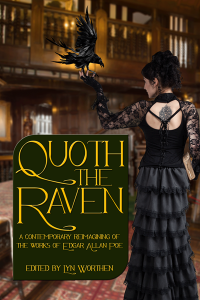 P.S.: Your story “Get the Door for Me, Will You, Edgar?” appears in Quoth the Raven. Please describe the real-life incident that prompted this scary story.
P.S.: Your story “Get the Door for Me, Will You, Edgar?” appears in Quoth the Raven. Please describe the real-life incident that prompted this scary story.
K.G.: I thought you’d never ask. I always taught a unit of Poe’s tales practically every year of my career, so Poe and I have a pretty good history. During one class (and during a heavy thunder storm, as in my story) I mentioned to my class how cool it would be if, by our discussing Poe’s works so thoroughly, we could somehow channel him — that is, make him appear in my classroom. I directed everyone to look at the door and picture Poe opening it and coming through. Of course, nothing happened. Not right at that moment, that is. Because when I returned to the lesson, maybe five minutes later, the door swung open — on its own! The windows were closed, so it wasn’t the wind. What was it? Or who was it? You got me.
P.S.: Aside from the “Edgar” story about an inner-city school English teacher, how has your background as an English and Film Studies teacher in Philadelphia influenced your writing?
K.G.: How much time have you got? Literature from the ‘greats’ has taught me some incredible writing tricks, and it’s amazing how much you learn about writing from teaching literature. I loved authors’ use of thematic symbolism (think Hawthorne’s Scarlet Letter, Fitzgerald’s The Great Gatsby, and Bradbury’s Fahrenheit 451 — and so many others.) Short stories? Poe, of course, Shirley Jackson, O. Henry. Characterization? Don’t hate me for this, but Shakespeare is up there. Also Steinbeck (Of Mice and Men), J.D. Salinger (Catcher in the Rye), and William Golding (Lord of the Flies). And, yes, I’ve even brought Stephen King’s work into the classroom just for the sheer fun of his brand of horror. I’ll shut up before this comes off as an English lesson.
P.S.: What are the easiest, and the most difficult, aspects of writing for you?
K.G.: Getting the idea for a new story is tricky because it seems practically any idea a writer may have has already been taken. So I observe just about everything for material that may inspire me to take an idea in a slightly different direction. The easiest aspect of writing? The first draft! I just let the words spill out, and I do damage control later. Once I’m on a roll most stories almost write themselves.
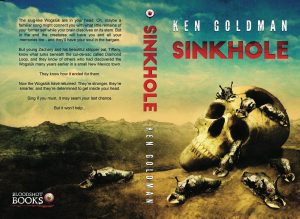 P.S.: Reading the comments on your second novel Sinkhole, I was struck by the words “gripping” and “intense.” Why do you think readers use those adjectives with this novel?
P.S.: Reading the comments on your second novel Sinkhole, I was struck by the words “gripping” and “intense.” Why do you think readers use those adjectives with this novel?
K.G.: I like to think that Sinkhole really is gripping and intense. I take a lot of time to merit those descriptions. Writing to me is rewriting, and I do a lot of that, sometimes tossing out great chunks of the first draft to tighten the plot—or sometimes even to change the direction of the story itself if I get better ideas. I’m my own worst critic. (Three stars *** for this answer)
P.S.: After noting your book makes several pop culture references, one reviewer said your book “feels like a genre that hasn’t been invented yet. Until now.” Do you think that’s true? Why or why not?
K.G.: I think that’s because I tend to genre-blend, if there is such a word. Sinkhole has horror, but there’s also some sci-fi elements, as well as: a Western sub-plot, slug-like monsters as well as murder-driven soul deprived humans, time travel, back stories, sex and love and cheating spouses, some porn (gasp!), good characters who do bad things/bad characters who do good things, macabre humor and dark horror with several twists at the end that I hope you won’t see coming. So, yeah, I guess that’s maybe like a genre that hasn’t been invented yet. But I’ve got the copyright now!
P.S.: You’ve made no secret about admiring Stephen King’s works. In what ways are your stories similar to his, and in what ways different?
K.G.: I don’t purposely set out to copy Stephen King because there already is a Stephen King. But I read most of his novels so the influences are there, especially his characterizations. I like the way he creates tight camaraderies among his characters in life or death situations, even when they’re complete strangers. On the other hand, I try to select plots that in no way resemble his, although sometimes a King-like plot will sneak in. (Note to King: Feel free to admire my work.)
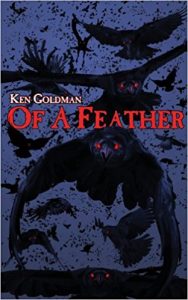 P.S.: Your first novel, Of a Feather, has garnered some excellent reviews on Amazon. Please help us understand the book’s protagonist, Socrates Singer.
P.S.: Your first novel, Of a Feather, has garnered some excellent reviews on Amazon. Please help us understand the book’s protagonist, Socrates Singer.
K.G.: Socrates Singer is your basic teenage outcast. His few close relationships mean everything to him, so when one goes bad and death claims another, he has difficulty coping. As a result, his ability to control hundreds of birds gets out of his control. He doesn’t set out to create mayhem, but his emotions do get the best of him.
P.S.: What is your current work in progress? Would you mind telling us about it?
K.G.: This is a little sad, but okay. I recently lost my pet parrot that I’d had for over 35 years. ‘Baby’ was like a muse, always at my side when I wrote, and I do miss that. I just completed a short story called (get your handkerchiefs handy) “Baby, Come Back”: A young woman loses her pet parrot and discovers a place that will clone the bird for her. That’s all I’m going to tell you!
Poseidon’s Scribe: Sorry to hear about your parrot, but even in death, it serves as your muse. What advice can you offer aspiring writers?
Ken Goldman: Read. Write. Then read some more. Then write some more. Reread, and rewrite. Lather, rinse, repeat. The end.
Thanks, Ken. My readers can find out more about Ken Goldman on Facebook, on Linkedin, on his Amazon Author Page, on Goodreads, and on Google+.
Poseidon’s Scribe

 d the politics of early science fiction, of Star Wars, of Star Trek, of more modern authors, and our own fiction. We agreed that politics, which one may define as the activities associated with governance and power, is inherently part of all science fiction, and perhaps all fiction, to some degree.
d the politics of early science fiction, of Star Wars, of Star Trek, of more modern authors, and our own fiction. We agreed that politics, which one may define as the activities associated with governance and power, is inherently part of all science fiction, and perhaps all fiction, to some degree.

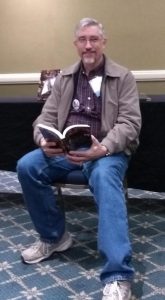
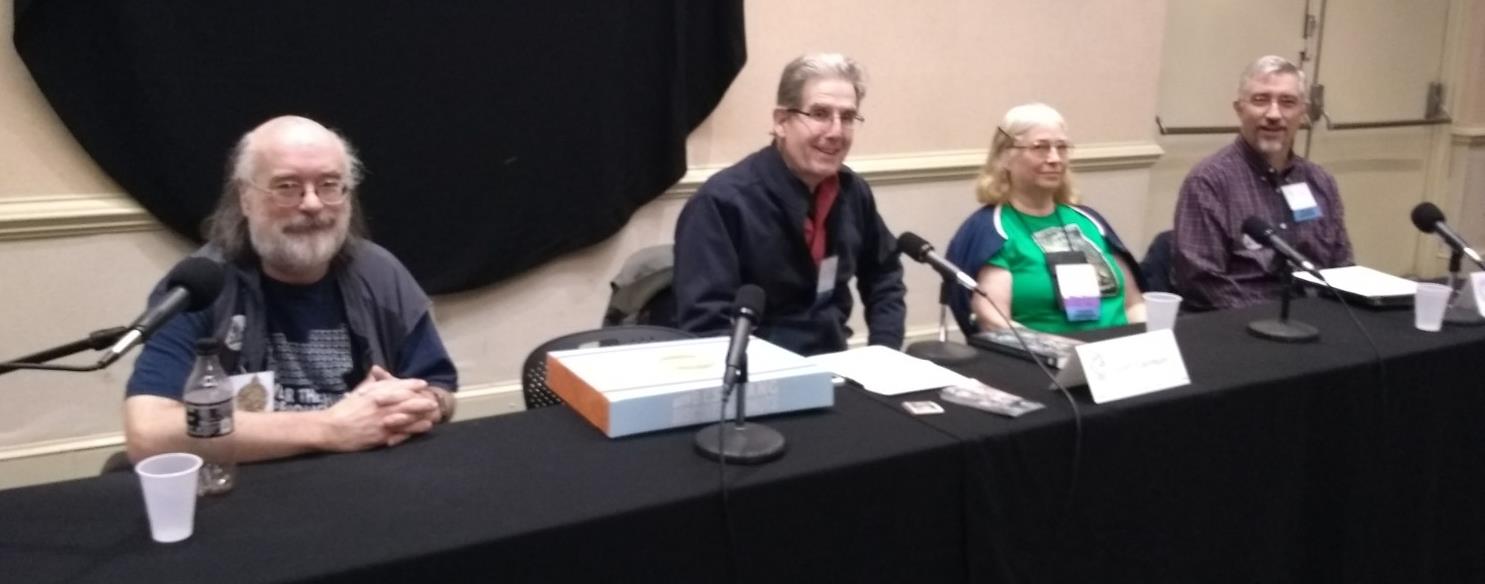
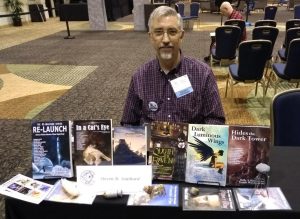


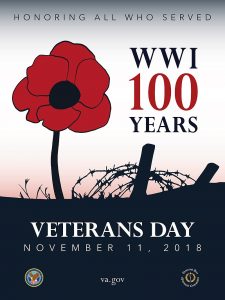
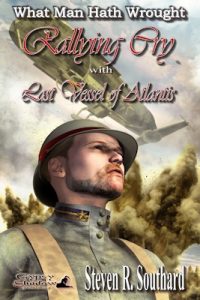
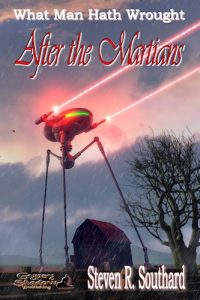

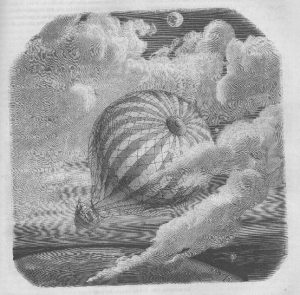
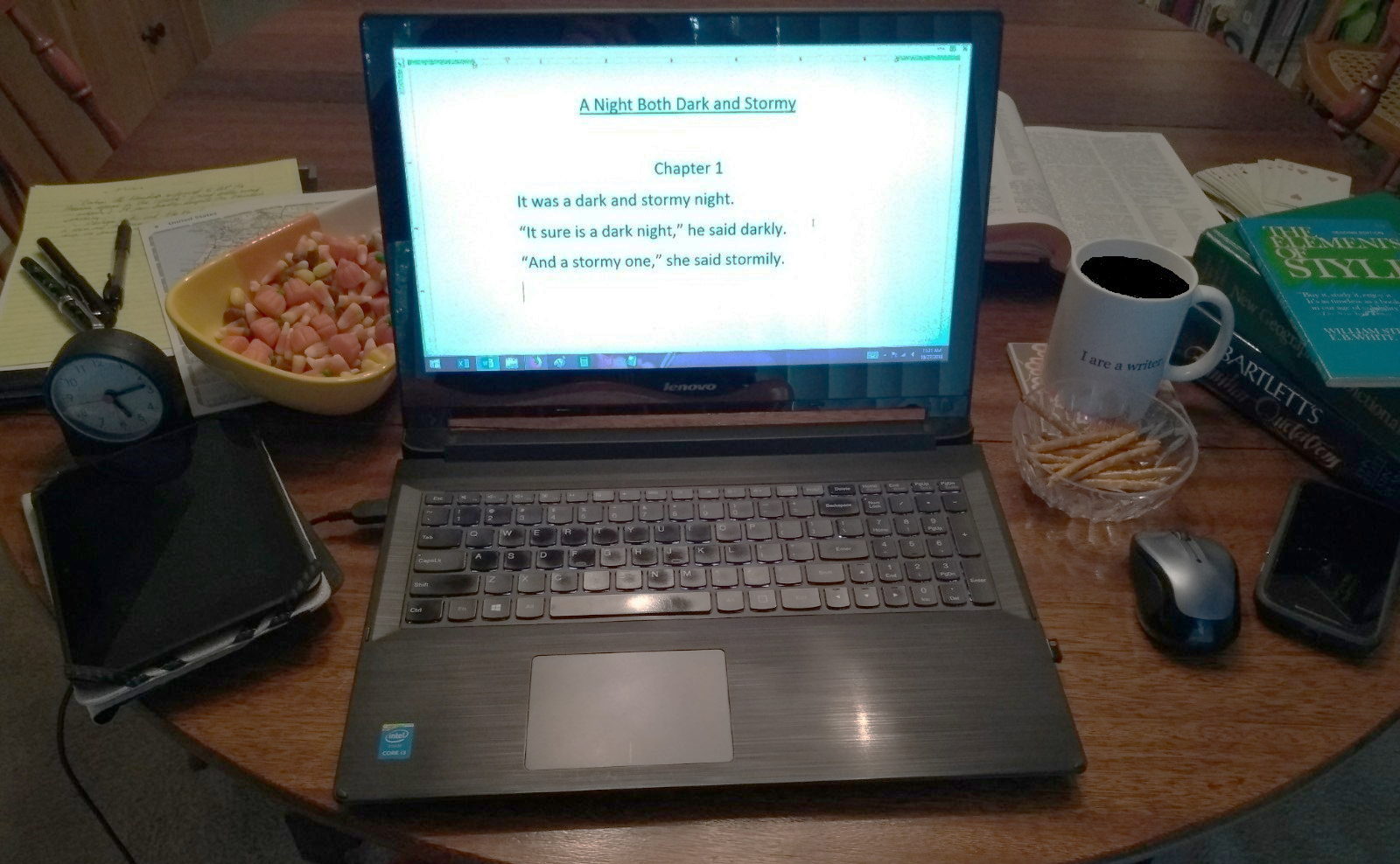

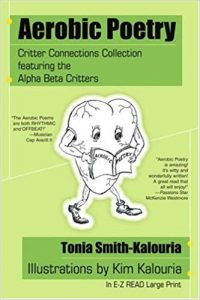



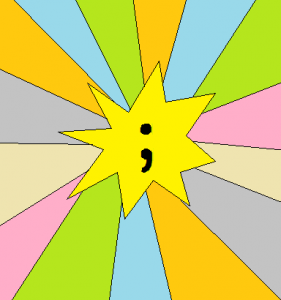 As a refresher, the semicolon links major sentence elements together. It can keep two related independent clauses loosely joined; it also separates items in a list, especially when some listed items contain commas.
As a refresher, the semicolon links major sentence elements together. It can keep two related independent clauses loosely joined; it also separates items in a list, especially when some listed items contain commas.